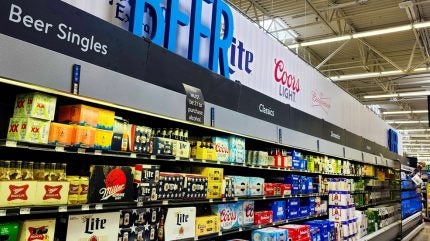
The ongoing pressure on beer sales in the US is “cyclical”, Molson Coors’ CEO has insisted, after the company’s sales suffered in the second quarter.
Muted demand in the US – which Molson Coors had expected to see improve in the second quarter – was a factor in the company’s changes to forecasts.

Discover B2B Marketing That Performs
Combine business intelligence and editorial excellence to reach engaged professionals across 36 leading media platforms.
In the three months to the end of June, Molson Coors’ volumes dropped 6.6% amid lower brand volumes in the US and the end of a contract brewing deal.
The decline was better than Wall Street had forecast but, speaking to analysts after the results were published, Molson Coors CEO Gavin Hattersley – who said in May he expected the US beer industry to pick up – conceded trading conditions had not improved.
“The industry did not get better as we were expecting it to,” he said. “We had expected it to navigate back to where it’s been for the last few years of around down 3% and it didn’t.
“Certainly, consumer confidence and the macro environment, whilst we continue to believe very strongly that it is cyclical, we’re not seeing any signs of that changing in the balance of the year, and it certainly didn’t in the second quarter.”

US Tariffs are shifting - will you react or anticipate?
Don’t let policy changes catch you off guard. Stay proactive with real-time data and expert analysis.
By GlobalDataMolson Coors’ previous expectation that the US beer industry would return to the recent run-rate of a 3% decline had “faced with considerable scepticism last quarter – and for good reason”, Barclays analyst Lauren Lieberman said in a note to clients today.
She added: “Molson Coors’ updated outlook strikes us as now rooted in a more reasonable view on the US beer industry’s near-term trajectory.”
Hattersley told analysts on yesterday’s post-results call that “the current industry decline is cyclical”, adding “Consumer confidence will turn I don’t know when but it will turn.”
Nevertheless, the Molson Coors CEO was pushed on whether the pressure on the US beer industry was cyclical given soft volumes in the sector for the past few years.
Hattersley said: “We continue to believe that over time, [consumer confidence] will change. I mean, it could be sooner rather than later, or it could be in the same time period next year.
The items that have been impacting the overall alcohol category – I’ve often heard GLP-1s talked about – we don’t have a lot of data that suggests that that’s having any meaningful impact on either the alcohol category or our category at this point.
“The other item that gets talked about is D9 [Delta 9]. The impact of D9 does vary by market. In some markets, it’s not sold. In others, it carries strong restrictions.
That’s certainly an area that we continue to monitor the impact of that. I think consumer confidence has had a disproportionate impact, as I said, across some consumers differently to others. And, again, we believe that that is cyclical.”
Hattersley said Molson Coors’ “core power brands” in the US – Coors Light, Miller Lite and Coors Banquet – had retained the “unprecedented shelf space gains” achieved in spring of 2024 when Anheuser-Busch InBev’s sales were hit by a marketing controversy.
“Banquet in particular, has been a strong performer. After 16 consecutive quarters of share growth, it was a top 5 volume share growth brand in the quarter. And given it’s only about half the buying outlets of Coors Light, we believe there is significant distribution runway ahead,” he added.
During the second quarter, volumes in EMEA and APAC missed Wall Street expectations and were another contributor to the new sales and earnings forecasts issued by the Madri owner.
The volumes from Molson Coors’ combined EMEA and APAC division fell 7.8%. The company pointed to “soft market demand and a heightened competitive landscape”.
Asked for more detail on the division’s performance and the company’s outlook for that side of the business, Hattersley pointed to competitive pressure in the UK and said the beer market in central and eastern Europe “remains sluggish”.
He added: “The market in the U.K. continues to decline in both channels. We have seen a little bit of a category improvement quarter-to-date, starting to see some trend improvement in our share trajectory.
“Competition in the marketplace, it remains intense, frankly. And despite the increase that we’ve seen in promotional frequency in the off-premise with our largest brand, it does remain challenged given the actions of some of our competitors, which we have chosen not to follow. I mean we’re seeing some of our competitors in that space price consistently 20% lower than Carling on shelf.” Madri volumes in the UK increased “mid-single digits”, Hattersley noted.
He added: “We continue to remain optimistic about the growth potential for our central and eastern European businesses. We’re putting investments behind our national power brands and we’re supporting the recent launches that we have in the above-premium space.”





